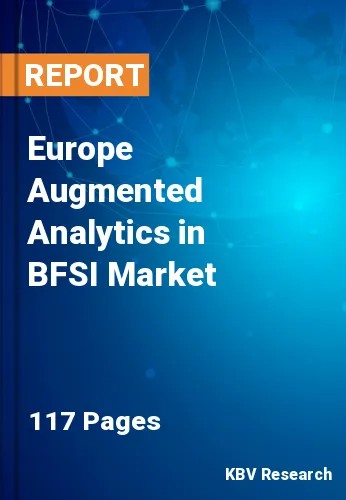The Europe Augmented Analytics in BFSI Market would witness market growth of 23.3% CAGR during the forecast period (2023-2030).
Poor data quality remains an urgent issue to address as a result of recent crises and shocks affecting financial institutions' well-being, reputation, and capacity for making decisions. Data quality and standardization are especially difficult to achieve because entries are logged more than once and are accessible across several platforms. This, in turn, has broad-reaching adverse effects on risk management, adherence to international regulations, fraud prevention, money laundering, and regulatory compliance, among other things. As a result, maintaining data integrity turns into a key tenet of the BFSI sector's digitalization, for which augmented analytics helps in various important aspects.
The BFSI industry Is heavily regulated and financial companies must adhere to several regulations and guidelines. As a result, augmented analytics technology aids these institutions in managing their data while maintaining regulatory compliance. Additionally, augmented analytics aid in reducing reporting errors and discrepancies, which is important for adhering to legal standards. In addition, augmented analytics aid financial institutions in gaining knowledge of consumer behavior, which may be used to enhance customer experiences and adhere to legal requirements for data protection and customer privacy. In a highly regulated sector like BFSI, augmented analytics aid BFSI organizations in enhancing decision-making capabilities, reducing risk, and improving compliance processes.
Regional nations are focusing on raising the level of digital finance literacy among citizens and users alike, which has resulted in a number of initiatives. For example, one of the main objectives of the National Financial Education Plan, which the Central Bank of Spain and CNMV implemented from 2018 to 2021, was digital financial literacy. The resulting need to improve financial literacy and digitalize financial services and products are viewed as significant areas of action. Moreover, the UK is the biggest financial center in the world, with a robust environment and a nationwide talent pool. The UK government continues to set the bar for technology and innovation in financial services, as seen by the rising percentage of banking firms that export from the nation. Due to these considerations, the regional market will grow in the next years.
The Germany market dominated the Europe Augmented Analytics in BFSI Market by Country in 2022, and would continue to be a dominant market till 2030; thereby, achieving a market value of $546.5 Million by 2030. The UK market is anticipated to grow at a CAGR of 22.3% during (2023 - 2030). Additionally, The France market would exhibit a CAGR of 24.2% during (2023 - 2030).
Based on Component, the market is segmented into Solution and Services. Based on Application, the market is segmented into Customer Analytics, Fraud Detection, Risk & Compliance Management, Portfolio Management, and Others. Based on Organization size, the market is segmented into Large Enterprises and SMEs. Based on Deployment Mode, the market is segmented into On-premise and Cloud. Based on countries, the market is segmented into Germany, UK, France, Russia, Spain, Italy, and Rest of Europe.
Free Valuable Insights: The Worldwide Augmented Analytics in BFSI Market is Projected to reach USD 8.1 Billion by 2030, at a CAGR of 23.6%
The market research report covers the analysis of key stake holders of the market. Key companies profiled in the report include SAS Institute, Inc., IBM Corporation, Salesforce, Inc., SAP SE, Microsoft Corporation, QlikTech International AB, Alteryx, Inc., Tibco Software, Inc. (Vista Equity Partners), ThoughtSpot, Inc. and Oracle Corporation.
By Component
By Application
By Organization size
By Deployment Mode
By Country
Our team of dedicated experts can provide you with attractive expansion opportunities for your business.

